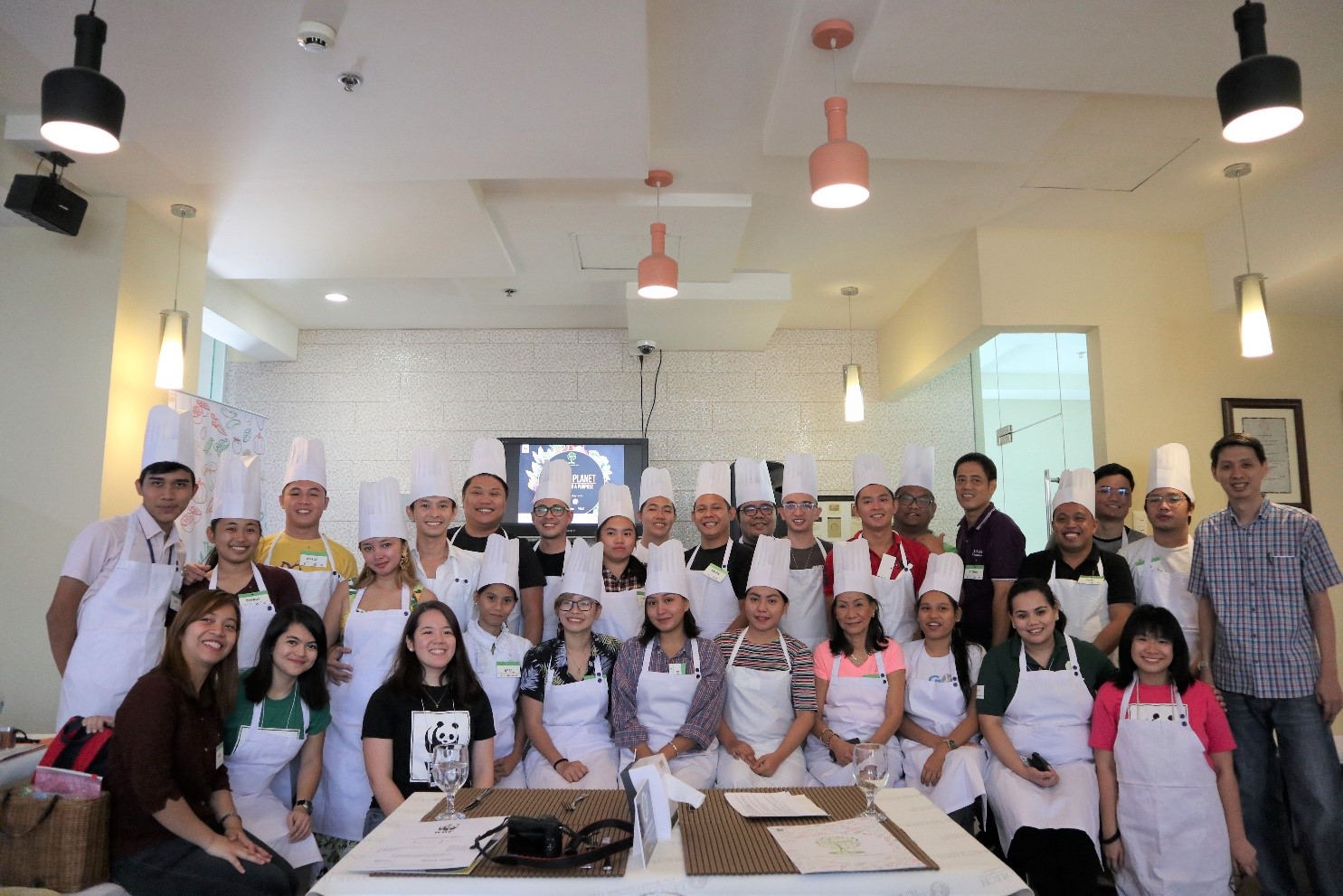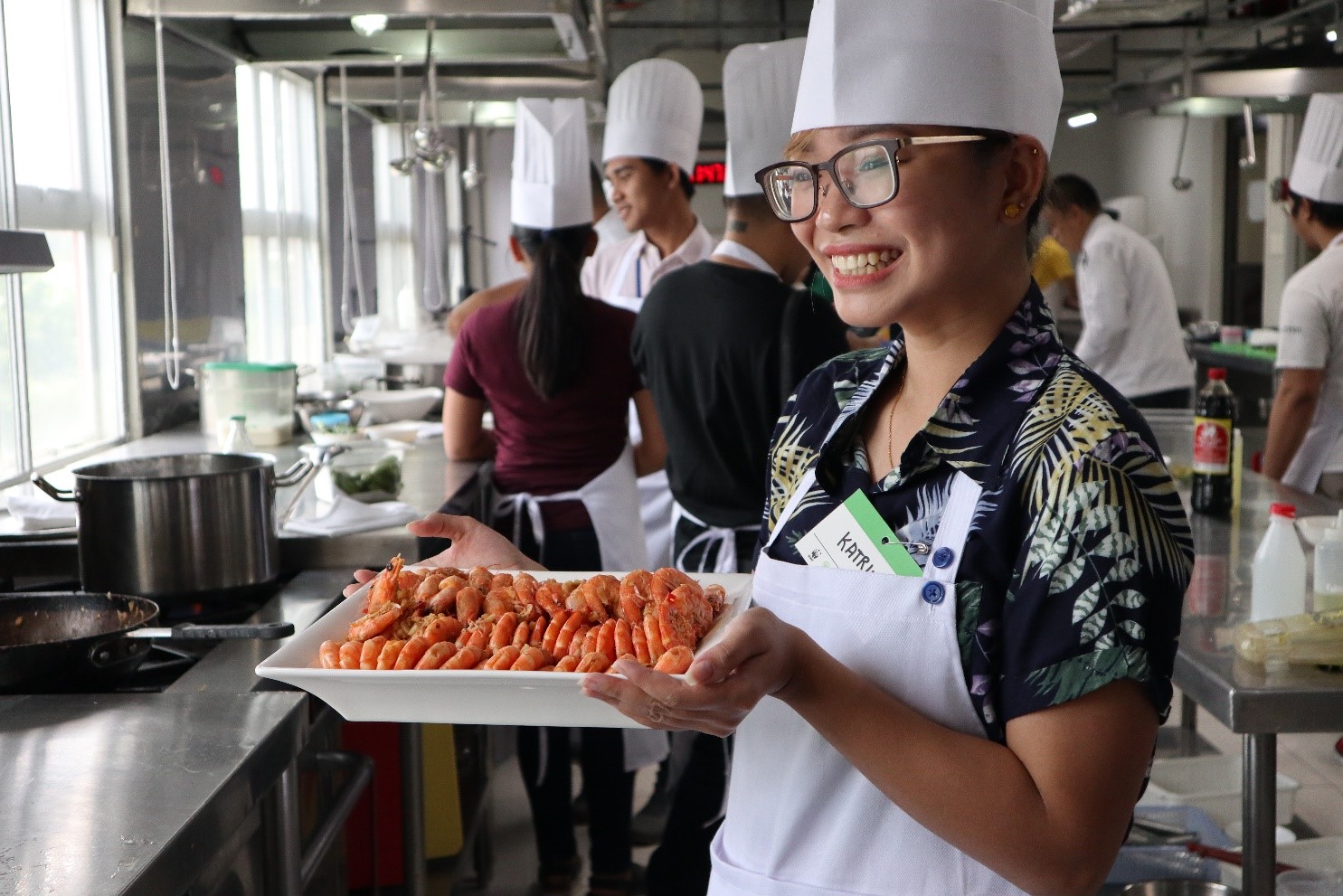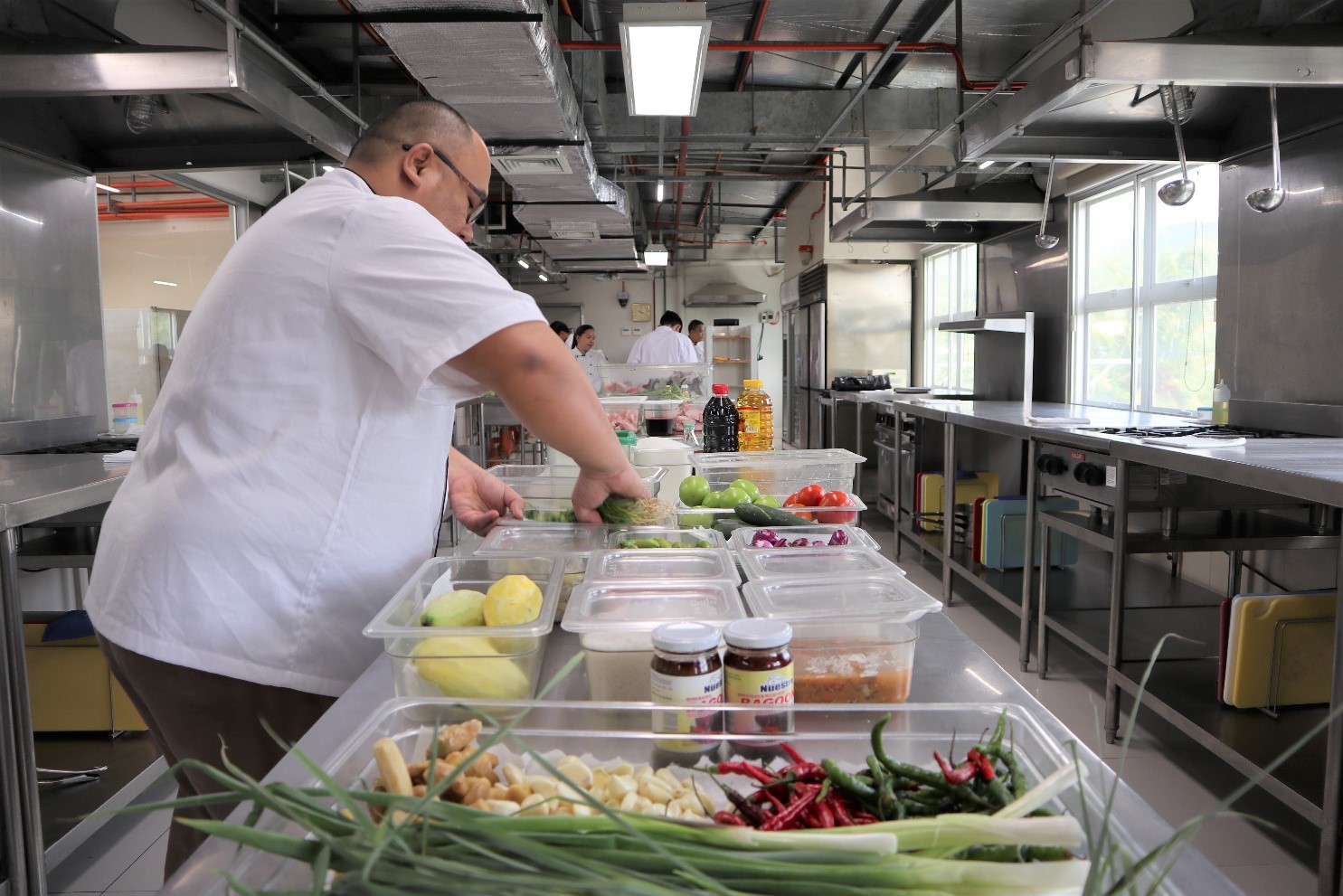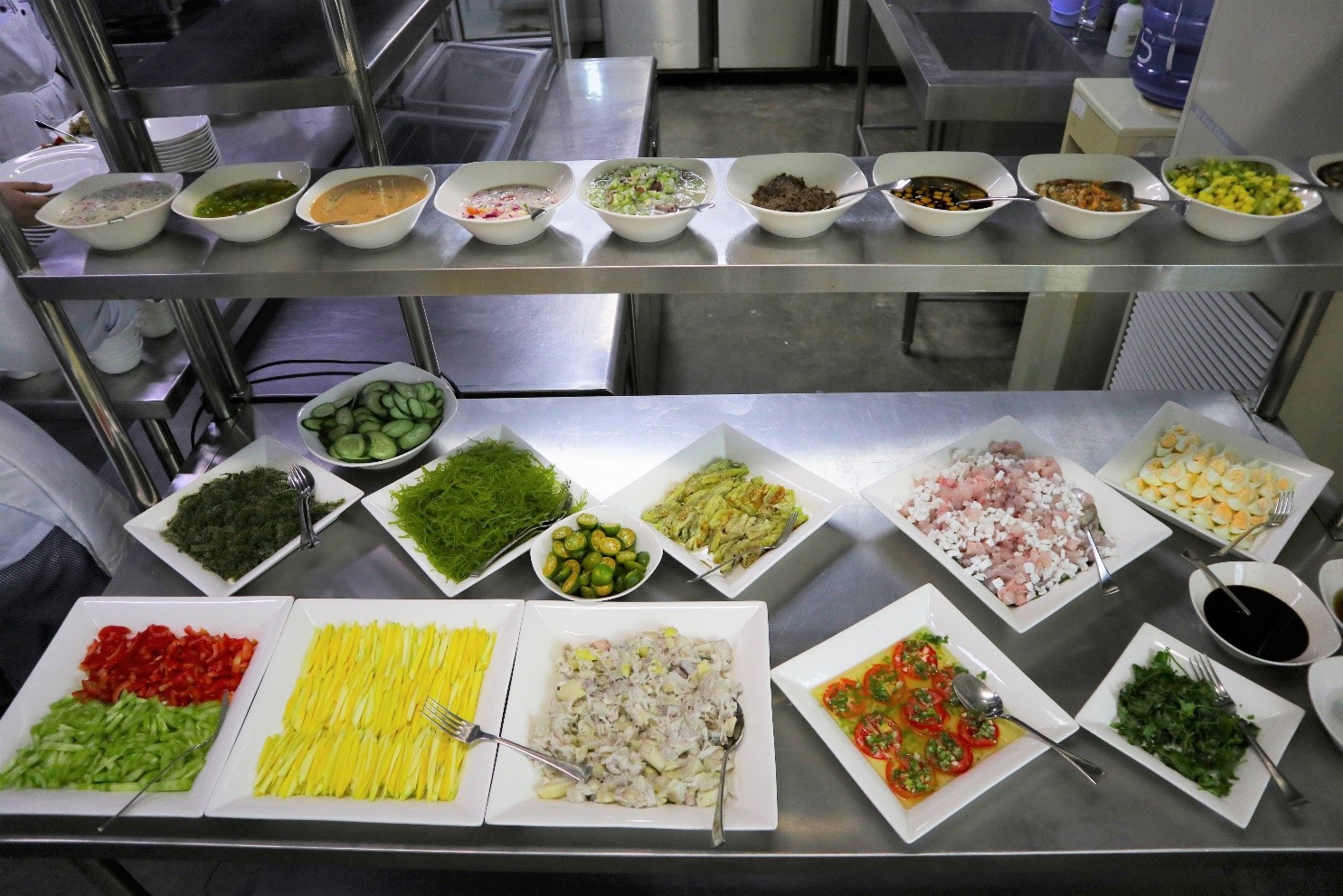Kaon Na ‘Ta! WWF-Philippines brings the Savour Planet workshop series to Cebu City
July 2018
Together with the International Culinary Arts Academy Cebu (ICAAC), WhenInManila.com, and Chef Tatung Sarthou, World Wide Fund for Nature (WWF) Philippines brought its successful workshop series for Filipino diners to Cebu City last June 30, 2018.

Participants from the Cebu City leg of Savour Planet: Cooking with a Purpose consisted of representatives from traditional and digital media, bloggers, local culinary students, and local foodservice entrepreneurs.
“As chefs, it is our responsibility to ensure that the local dining industry continues to flourish. But then, somewhere along the way, wanting to make it flourish may have also led to some unsustainable practices.”
This was one of the personal realizations shared by Chef Myke “Tatung” Sarthou with the very attentive Cebuano audience, who listened to him in awe as they enjoyed sumptuous plates of vegetable breakfast muffins and Croque Madames. The participants, consisting of representatives from local newspaper and digital media outfits, travel and food bloggers, lifestyle influencers, and culinary students, appreciated the affair, more so because the award-winning celebrity chef also hails from the Queen City of the South.
“We got so hung up on techniques and prestige – keeping up with global trends - and all of these other technicalities that we have made food very complicated. And now, it’s time for us to correct this and to go back to basics – to let the natural flavor of each ingredient stand out instead of turning it into something that it is not.”
Filipinos have always taken food seriously – lightheartedly, yes, but seriously nevertheless. Whether through passing down heirloom recipes to the next generation, preserving provincial versions of the same Filipino dish, planning what to cook for the family’s baon, or even as simple as choosing where to dine to entertain family and friends, food has always been the center of Filipino social affairs. It’s no wonder that food has been used as a tool to measure so many things in our society – wealth, class, talent, knowledge, and taste. The more sophisticated your tastes are, the more complicated the dishes you prepare, the more exotic the ingredients you use, the higher you belong in the social ladder. And perhaps, this is one of the reasons the restaurant industry has become so unsustainable. Have we, maybe, forgotten that cooking has always been rooted in making delicious dishes based on the best local ingredients the place has to offer? That, more than keeping up with the trends, cooking has always been about nourishing the body and showing our love for others through food?
Recognizing that this change in how we see food contributes to the issue of food sustainability, WWF-Philippines, through its pioneer project on sustainable consumption and production, The Sustainable Diner: A Key Ingredient for Sustainable Tourism, has brought its flagship workshop series entitled Savour Planet to a food and tourism mecca in the Visayas region, Cebu City. The workshop series aims to empower and educate Filipino diners, partners from the media, the academe, as well as fellow non-government organizations and food security projects on the importance of sustainable food systems and sustainable dining. The series was launched in Cebu City through the second leg of Cooking with a Purpose, where Cebuanos were invited to participate in a live cooking session that embodied the market to plate concept, cooking their own food from fresh ingredients sourced straight from Carbon Market that morning, and linking the concept of sustainable dining back to where Filipinos first learn many important details about cooking: their own kitchen.

Participants were grouped into teams of three to four each and were assigned to perform a specific Filipino cooking technique, using fresh, local ingredients bought from Carbon Market the same morning.
Chef Jeremy Young, Dean and Head Chef of ICAAC, opened the workshop by discussing the importance of promoting the concept of sustainable dining in the academe, stating that the appreciation for local cuisine and the ability to craft dishes that allow local ingredients to shine are major perspectives that should be taught to the next generation of culinary and restaurant professionals. “We’ve always seen our school as an ideal training ground for aspiring chefs – culinary and hospitality professionals with a passion for excellence and trained in the best local and global traditions of the culinary world. However, we also want to develop leaders whose standards and vision can take the culinary and hospitality industry to the next level – and this next level refers to ensuring that we keep food sustainability – and inevitably our jobs and industry – alive.”
Melody Melo-Rijk, project manager of The Sustainable Diner project and sustainable consumption and production in the Philippines, reiterated the need to change Filipino mindsets when it comes to food, stating that sustainability has always been the core of Filipino cooking and dining. “If we look at the habits that were passed down to us by our parents and grandparents, they have always been unknowingly rooted in sustainability. Ubusin mo ang pagkain mo (Finish your food). Huwag mong sayangin ang nasa plato (Don’t waste what’s on your plate). Kainin mo ang bawat butil (Eat every grain of rice). Kumain ng gulay at isda (Eat vegetables and fish). Avoiding food waste, eating local produce, and going for healthier dishes – these are the childhood lessons we grew up with and all of them are related to food sustainability”,’ says Melo-Rijk. “Which is why it is a wonder that it is not translating to how we behave whenever we dine out in restaurants. Perhaps because a lot of our dining decisions inside restaurants are dictated by factors that are not present at home – the choices that we have in every menu and the processes that go into preparing each of the dishes in that menu. Even by external influences such as trends, traditional media, and social media. This is where we need the help and support of the food service industry as well as the media and the academe. I believe that it is high time that we bring back value to food.”
The discussions were followed by a short brief courtesy of Chef Tatung, and then straight to a live cooking session delivered by the chef and his assistant chefs, Chef Gail Paolo Rimando and Chef Hernan Figueroa, who assisted the participants along with kitchen assistants and culinary students from ICAAC. The format for the Cebu City leg of Savour Planet was different than the one conducted in Quezon City – instead of being provided with recipes that they will follow, participants, divided into groups of three or four, were given basic cooking techniques to perform on ingredients that were bought based on what was available and abundant in the local market for that day. One group was assigned to make different types of local sawsawan or sauces/dips, another group was tasked to handle tola or tinola, another to do pinais – steamed fish wrapped in banana leaves, and of course, three groups to handle Cebu’s signature SuTuKil – Sugba (grill), Tuwa (stew), and Kilaw (raw seafood in vinegar).

Chef Myke “Tatung” Sarthou gave a short briefing on the state of food sustainability in the local dining industry before leading the participants to ICAAC’s kitchens for the live group cooking session
Chef Tatung, on the other hand, emphasized that by learning how to cook, even just the basics, Filipino diners will have an easier time incorporating sustainability in their daily dining habits. “Recipes are useful and important, yes. However, what will happen if the ingredients in those recipes aren’t available or aren’t in season? This is where importation comes in, where the demand for ingredients that are not in season or local comes in”,’ says Chef Tatung. “It is important for us to learn how to cook, not just learn how to follow recipes. Because if we learn how to cook, then it would be easy for us to use what’s available in the market as replacements in the recipes that we do have. Because if we learn how to cook, we see these ingredients in the market and we would instantly know what we can do with them. Sustainability in dining means using what’s available, what’s local, and what’s in season, and if we know how to cook, we won’t look for ingredients that are simply not there. It’s really going back to the basics of cooking, because how we used to cook and see food, that was based on what we now consider as sustainable food practices.” The session has produced a banquet of fresh, local dishes – delicious and sincere in its simplicity – which the participants actually shared with each other for lunch.
By allowing Filipino diners to cook their own food, using ingredients that were not pre-planned or bought based on prescribed recipes, WWF-Philippines hopes to instill in them an appreciation not just for our local ingredients and local cooking techniques but also for the basic essence of Filipino cooking – to nourish and feed others with love – which will hopefully translate to more mindful, eco-friendly choices whenever they dine out in the future.
Basta simple ug lokal ang pagkaon, lami gud kaayo na nga pagkaon!

A look at some of the food prepared by the participants. Students and kitchen assistants from ICAAC also helped them arrange the food in an orderly manner. These were served for lunch, which everyone enjoyed while synthesizing the whole experience.
The Sustainable Diner project, under WWF-Philippines’ Sustainable Consumption and Production, is part of the International Climate Initiative (IKI). The Federal Ministry for the Environment, Nature Conservation, and Nuclear Safety (BMU) supports this initiative on the basis of a decision adopted by the German Bundestag.
For more information, please contact:
Ms. Melody Melo-Rijk
Project Manager, Sustainable Consumption and Production (SCP)
Ms. Lorayne Roque
Sustainable Dining Specialist
